
Premenopause (Perimenopause) - What is it and how does it manifest itself?
Menopause isn't just about the absence of periods and possible hot flashes that take you by surprise. Before a woman's body truly enters menopause, it goes through many other changes, including perimenopause symptoms.
Premenopause or perimenopause refers to a transitional state of the body towards menopause, which marks the end of the fertile period in a woman's life. Find out in this article everything you need to know, because regardless of your age, it's in your best interest to understand your body.
What is premenopause?
Perimenopause is when your body begins to transition into menopause. This can start as early as the mid-30s or mid-50s, but as a rule, this period starts 3 or 4 years before the woman's body enters menopause, but in some cases, this can happen as early as 10 years before.
During this transition, the ovaries produce fewer hormones, causing the menstrual cycle to become irregular. However, one egg is released at a time, so a woman who is in the transition to menopause can still get pregnant. At this point, the body is heading towards the end of its reproductive years.
Other physical changes and symptoms may occur as the body adjusts to different hormone levels. Premenopause officially ends and menopause begins after 12 consecutive months have passed without menstruation.

Symptoms & signs: How does premenopause manifest itself?
Perimenopause symptoms, the age at which they start and how long they last vary from woman to woman. No one can say exactly what you will experience, but here are some of the most common symptoms:
Hot flushes
sensitive breasts
dry, thinning skin
hair loss or thinning hair
bone fragility
accentuated premenstrual syndrome
changes in cholesterol levels
reduced sexual desire (libido).
fatigue
irregular periods
vaginal dryness and, implicitly, discomfort during sex
decreased fertility
involuntary loss of urine when coughing or sneezing
Urge incontinence - an urgent need to urinate more and more often
mood swings or disturbances
problems with sleep
difficulty concentrating
How long does premenopause last?
The age of entry into perimenopause can vary significantly from one woman to another. Signs can appear around the age of 40, but there are women who notice these changes after 35. On average, premenopause lasts 3-4 years, but it can last only a few months or it can stretch for 10 years.
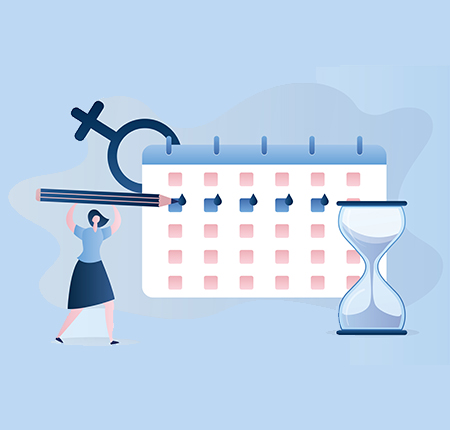
Perimenopause is a transitional period that ends in menopause. Basically, menopause means that menstruation has ended. When you haven't had a period for 12 months, you've officially reached menopause.
Menstrual cycle in premenopause
During premenopause, the level of estrogen (the main female hormone) varies irregularly, rising and falling continuously. This causes menstrual cycles to be longer or shorter, but there can also be menstrual cycles when the ovaries do not release the egg (do not ovulate). In addition, menopause-like symptoms such as hot flashes, sleep disturbances and vaginal dryness may occur, but don't worry as there are many treatments available.
A first step you can take for your health is to switch to organic intimate care, which makes a real difference. Mother Nature gave us everything we need to create ENROUSH absorbents and tampons , without chemicals, fragrance, chlorine, plastic or synthetic fibers. Using only GOTS certified organic cotton, we create products for you that take care of your comfort and safety, regardless of the day of your menstrual cycle. All our products are 100% gynecologically approved, so don't worry, you're in good hands.
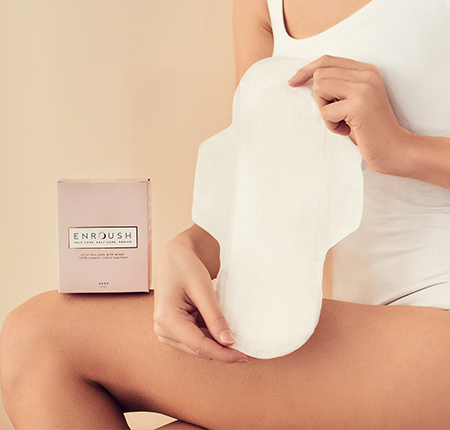
It's time to stop letting conventional products dictate the rules for your body and choose to use products that take care of you, so that you feel good every day. The world of ENROUSH awaits you with open arms.
Ovulation & premenopausal pregnancy
Although fertility declines during perimenopause, it is good to know that the ovaries are functioning during this period and release one egg at a time, as usual. As long as you have periods, pregnancy is possible.
If you still don't know how to calculate ovulation, it's the perfect time to read our article on Fertile Period . Here you will find numerous calculation methods for your ovulation period and we will also answer questions you didn't know you had asked yourself until now.
Causes & Risk Factors - Why does perimenopause occur?
The causes of premenopause are not numerous. During this period of transition to menopause, the production of estrogen and progesterone begins to fluctuate, rising and falling. Many of the changes a woman goes through in perimenopause are actually a consequence of low estrogen levels.
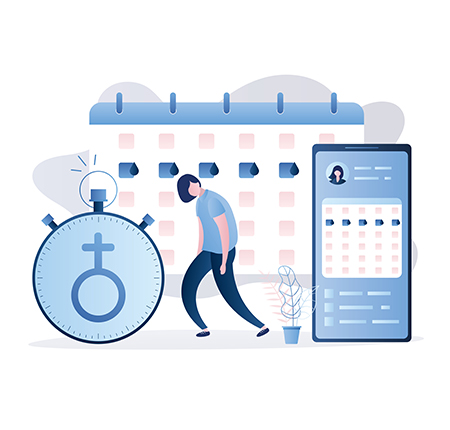
Menopause is a natural stage in a woman's life, but sometimes it can occur earlier than expected. Some evidence suggests that certain risk factors influence the onset of perimenopause more quickly, namely:
smoking
family history
oncological treatment (treatment of cancer by chemotherapy or radiation therapy of the pelvic area)
hysterectomy
Premenopause, menopause & post-menopause - What's the difference?
Each of these stages represents a gradual change that usually takes place over several years.
Premenopause or perimenopause occurs in the fourth decade of a woman's life, but sometimes it can also occur after 30 years. Symptoms may become more pronounced as menopause approaches. As a rule, the woman enters premenopause 3-4 years before menopause and this period ends 12 months after the last menstruation.
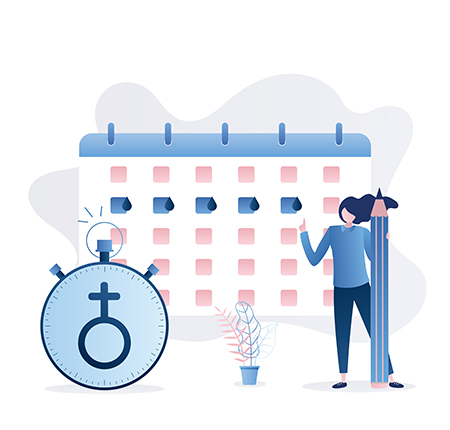
Menopause means that the ovaries stop releasing eggs and estrogen production drops substantially. Symptoms during premenopause can continue after menopause. Most women enter menopause between the ages of 40 and 58, and the average age is 51. Do you want to know even more about the subject? Discover everything about Menopause in our article dedicated entirely to the causes, symptoms and treatment specific to this period.
Post-menopause is the stage after menopause. During this time, symptoms may intensify due to low estrogen production. In general, however, the woman will have less intense menopausal symptoms.
Premenopause treatment
There are several types of treatments that can help ease premenopausal symptoms. What is important, however, is to consult with your gynecologist or specialist to get the results you want and use solutions that are right for you.
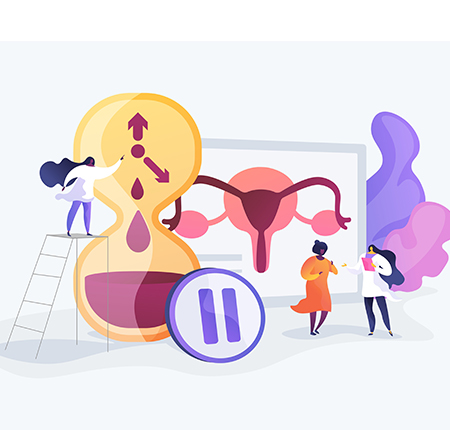
Hormonal treatment in premenopause
Hormone therapy is helpful for some women.
Systemic estrogen-based therapy (in the form of pills or tablets, patches, gels or creams) is considered the most effective treatment option to relieve hot flashes and night sweats, common symptoms in premenopause and menopause.
Depending on the woman's medical history and health, the doctor may recommend (very) small doses of estrogen to relieve symptoms. If deemed necessary, he may also prescribe progesterone in addition to estrogen therapy.
Another hormone treatment your doctor may recommend is a progesterone cream. which helps in case of vaginal dryness and also provides protection against premenstrual syndrome.
Another hormonal treatment used in premenopause is oral contraceptives. If your menstrual bleeding is irregular and you don't want to get pregnant, birth control pills with a low dose of hormones are a good option. As ovulation is suppressed, menstrual flow and periods are regulated, hot flashes disappear and vaginal dryness is reduced.
There are also estrogen-based treatments that are administered vaginally and can be used to relieve premenopausal symptoms. These are products that can be inserted into the vagina to relieve vaginal dryness and pain that women feel during sex.
Antidepressant treatment for perimenopause
Some antidepressants can reduce some of the symptoms of menopause, such as hot flashes. Such treatment is usually recommended for women who, for some reason, cannot take estrogen.
Natural premenopause treatment
If you consult your doctor, he will recommend the right treatment for you. Natural options include:
for the health of the bone system - calcium and vitamin D
in the case of a low libido - the doctor can prescribe a testosterone supplement
Some lifestyle changes are also sometimes welcome, such as:
a healthier diet
light exercise
avoiding foods or activities that cause hot flashes
Before deciding on any form of treatment, talk to your doctor about your options, as well as the risks and benefits of each option. That way you will be able to make the right decision for you.
Tests & analyzes - Diagnosing premenopause
Only the specialist doctor can make the diagnosis of premenopause, following the patient's symptoms. Most of the time, a blood test helps to determine the level of hormones, but it should be remembered that their level is changeable during this period.
We're all different, and that means some women get through symptoms without much effort, while others seek medical attention when symptoms set in. However, it is always recommended to consult a doctor if unusual symptoms appear or if their intensity increases sharply.
Premenopausal complications
The first sign of perimenopause is usually irregular periods. Most of the time, this aspect is something normal in that period of your life. However, do not postpone a visit to the doctor if:
the bleeding is profuse - you have to change the tampon every 1-2 hours
bleeding lasts more than 7 days
bleeding occurs between menstrual periods
Menstruation frequently occurs less than 21 days apart
These situations may mean that you are dealing with a more difficult problem in the reproductive system. For diagnosis or treatment it is absolutely necessary to consult a doctor.
Helpful tips for managing premenopause
Perimenopause brings with it a series of changes in the woman's body, influenced mainly by variations in estrogen levels. That's why, to improve your quality of life in premenopause, it's important to take care of yourself and you may want to follow some of our tips:
it helps you to exercise (low effort), at least 30 minutes every day
quit smoking
get enough rest and try to create a regular sleep schedule
avoid drinking alcohol and cut back on caffeine
try to reach a body weight that pleases you and keep it constant
include calcium in your diet
ask your doctor if you should take a multivitamin supplement
if low libido affects your intimate life, seek the help of a therapist (with or without a partner)
Frequently asked questions
Still have questions? We now answer a few more of them.
Can you get pregnant in premenopause?
As in premenopause your ovaries are still releasing eggs, yes you can get pregnant! For a contraceptive method suitable for you, consult your gynecologist.
Why do breasts hurt in premenopause?
During perimenopause, estrogen and progesterone levels in the body fluctuate unpredictably, and this is responsible for breast pain associated with menopause. It is nothing unusual if you notice that your breasts increase in size, decrease in volume or change in shape during this period.
Are contraceptives recommended in premenopause?
Contraceptives can only be recommended by the specialist doctor and in some cases, yes, they are even used as treatment during the premenstrual period.
At what age does premenopause start?
Premenopause sets in at different ages, but it is usually possible for the first signs to appear around the age of 40. On average, menopause occurs around age 51.
How long does the premenopause period last?
The premenopause period can last a few months or even a few years, but it usually manifests itself over the course of 4 years. This ends when 12 months have passed since the last period and then menopause begins.
How can you manage hot flashes in premenopause?
Many women are able to manage hot flashes with simple techniques and methods, including: layering (so you can dress/undress as you feel), drinking ice water at the onset of a hot flash, using underwear and clothes cotton (increased comfort overnight).
Can perimenopause be prevented?
Perimenopause cannot be prevented, but it can be delayed.






















